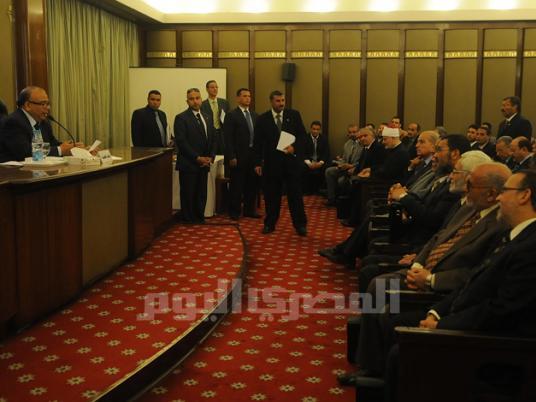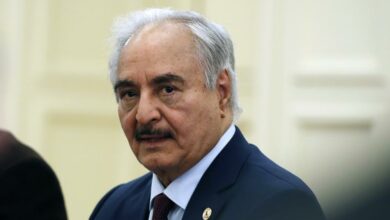
The ruling by the Cairo Administrative Court that halted the Constituent Assembly has thrown the transition timetable into disarray.
The court order stopped the formation of Parliament’s handpicked constitution-writing assembly, which has come under severe criticism because MPs fill half its seats.
This gave the assembly an Islamist slant, with more than 65 members of the 100-member assembly affiliated with Islamist parties and organizations. The case has been referred to the Supreme Administrative Court for a final ruling.
The court decision delays the process of constitution-writing, throwing into question the powers according to which the next president, set to be chosen in May, will rule.
This delay, observers say, could deepen the rift between the state’s two strongholds — the military institution and the Muslim Brotherhood, which dominates Parliament — about power-sharing dynamics.
The Brotherhood has been trying to appropriate some executive powers in fear that, as per the Constitutional Declaration that currently runs the country, Parliament does not hold enough powers.
Accordingly, the group has been calling for sacking the cabinet appointed by the military last November and forming a new one. It also hopes to field two candidates in the presidential race.
This week’s announcement of the presidential candidacy of Omar Suleiman, the ex-spy chief who is believed to be backed by the military, is only deepening the rift.
The legal basis for the Constituent Assembly case was a 1994 ruling by the Supreme Constitutional Court that said Parliament cannot elect MPs to such a body if it has been tasked with handpicking the members.
The verdict for the current case can be appealed, but the Supreme Administrative Court ruling will be final. This legal intervention comes amid a political impasse that has emerged after the pullout of several members of the Constituent Assembly for the overt Islamist representation in it.
Cairo University political science professor Mustafa Kamel al-Sayed was a member of the Constituent Assembly before pulling out. He is also one of those who filed the plea to the Cairo Administrative Court against the assembly.
“I was abroad and I accepted to become a member of the Constituent Assembly without knowing the full list of members. But once I knew the full composition of the assembly and in consultation with other members, we decided to withdraw because we think the criteria for selection was not clear, and having 50 percent coming from the two houses of Parliament was excessive,” he said.
Sayed added that many of the leading constitutional experts in the country were excluded from the assembly and that the two majority parties in Parliament, the Brotherhood’s Freedom and Justice Party and the Salafi Nour Party, “took liberties in their selection to include people representing their ideology, and their choice was biased in favor of those close to them.”
Brotherhood member Saad al-Katatny, the People’s Assembly speaker and head of the assembly, responded by suspending its meeting, which was supposed to be held Wednesday.
FJP President Mohamed Morsy told reporters in a press conference that the party respects the Egyptian judiciary and doesn’t intend to appeal the court ruling because they are not a party involved in the dispute. This, however, contradicts statements to the press by Brotherhood leader Ahmed Abu Baraka, who said the group does intend to appeal the ruling.
Some observers say the court ruling might be a diplomatic way out for the Brotherhood after critical pullouts have delegitimized the Constituent Assembly. Al-Azhar, the Supreme Constitutional Court and the Coptic Orthodox Church, as well as liberal and leftist parties, withdrew their members.
But some have already been vocal about the court ruling, saying it poses a threat to the separation between the legislature and the judiciary.
“The ruling sets a critical precedent that clashes with the separation of powers principle, which is the basis of stability for any political system in the world,” Brotherhood lawyer Abdel Moneim Abdel Maqsoud told the group’s mouthpiece newspaper Freedom and Justice.
“I would hope that the leaders of the FJP would reconsider their position and, instead of claiming that this is interference in the legislature, and in consultation with other political forces, come up with a new composition that meets the national consensus criteria,” Sayed said.
Yasser Kassab, head of the Regional Center for Parliamentary Studies and Consultancy, warned that the longer the transition process went on, the worse it would be for the majority of Egyptians, and for the two major blocs in Parliament as well — the FJP and Nour Party.
“The confusion, however, is not good, and SCAF and majority parties are responsible for this and have bungled the transition process, excluding others, including the revolutionary groups. The scene is very different, and the transitional process drags on and the complications increase,” he said.
Another court ruling that might endanger Parliament is set to be heard in April by the Supreme Constitutional Court. The court will decide whether the contested formation of the legislative chambers is constitutional — if not, Parliament should be dissolved.
“Parliament and SCAF are playing a game of cat and mouse now in the judiciary and we as citizens are the ones who lose. The longer the transition process goes on, the more Egyptians suffer. We don’t want this to go on for much longer because it just leaves us a choice between the Brotherhood or the military and the previous regime,” Kassab said.
But not everyone sees the recent court ruling as just a face of a mounting rivalry between the Brotherhood and the SCAF.
Sayed believed that the relationship between SCAF and the Brotherhood is a complex one that involved “rivalry on the one hand and complicity on the other.”
“The democratic evolution of the country depends on consensus between three sides [SCAF, the Islamists and the revolutionary forces],” he said. “The three forces should come to an agreement and without this agreement there, it will be very difficult to have a smooth transition process to democracy.”




